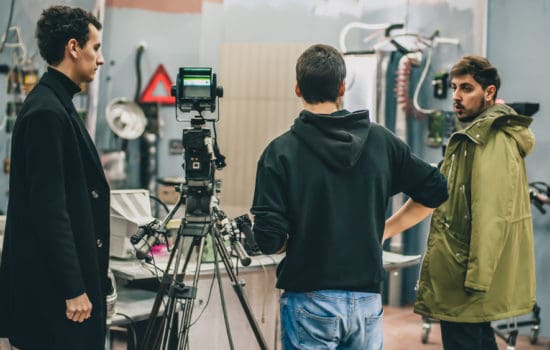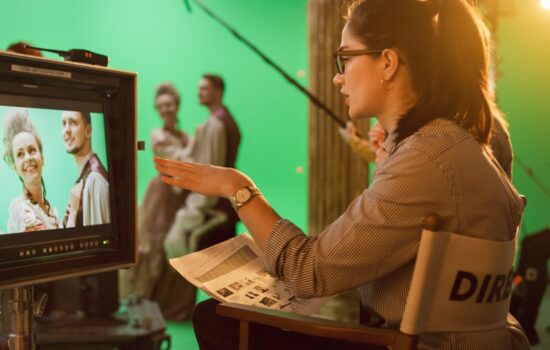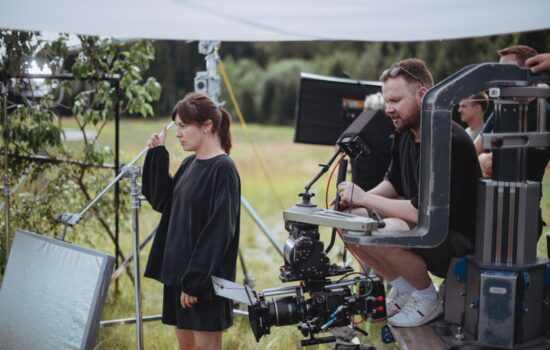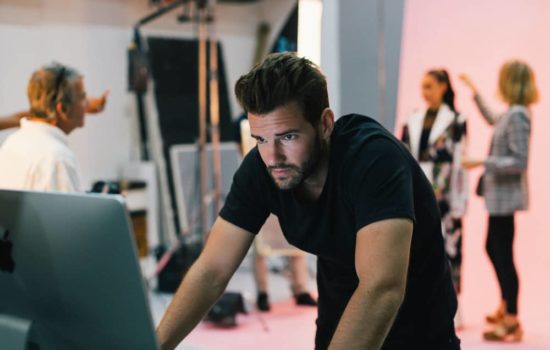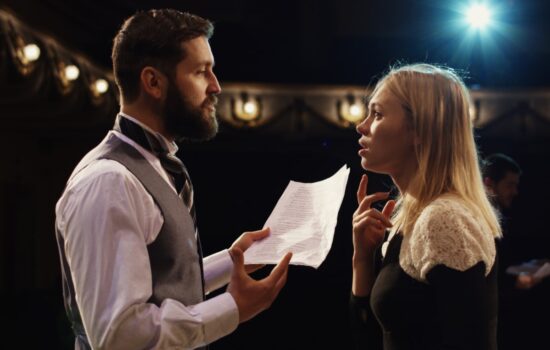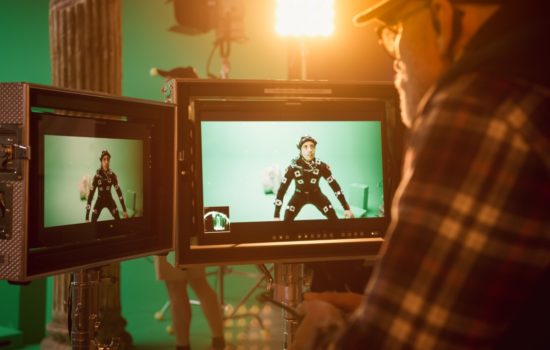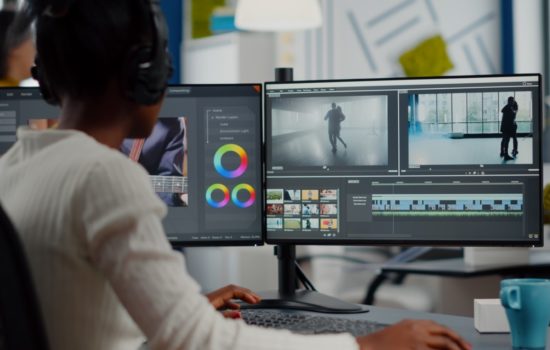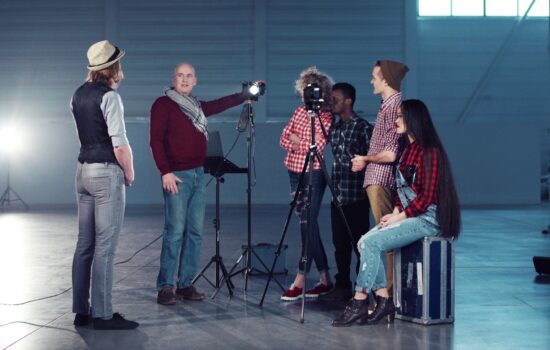1st Assistant Director
Career Overview
The 1st Assistant Director manages the schedule for a film set and coordinates all on-set departments for each shot.
Alternate Titles
1st AD
Salary Range
$50,000 to $75,000

How To Become a 1st Assistant Director
People also ask
Career Description
The 1st Assistant Director or 1st AD plays a vital role on a film, as this is the person who ensures a smooth production. They’re the person who “runs the set,” but their job begins well before the camera starts rolling.
A 1st AD first helps in determining how every single scene in a script is going to be shot. That means creating a script breakdown that analyzes what kind and how many shots will be needed for each scene. While still in pre-production, a 1st AD will create a shot list alongside the Director and Director of Photography. They are included as well in the storyboarding process, as it helps in the visualization of those shots.
The 1st AD is also the person who creates both the shooting schedule for the entirety of principal photography and the call sheet for each individual day of production. During production, they are the liaison between the Director and the rest of the crew. That means tracking how long each shot is taking and keeping the crew on schedule. The 1st AD will likewise evaluate the daily progress of a production to determine if they are tracking with the projected amount of time required to complete the production.
As the above responsibilities demonstrate, the 1st AD is critical to the success of a film, TV show, commercial, or other type of production.
To learn about the role of the 1st Assistant Director and what this integral role does on set, we spoke to three 1st ADs working in film, TV, and commercial production.
In this article, you’ll hear from:
- Rudy Van Zyl (American Horror Story, SpongeBob SquarePants)
- Tony Kountz (MacGuyver, The Originals, CSI: NY)
- Billy Greenfield (Dollface, Get Shorty, Fatal Affair)
What does a First Assistant Director do on a film set?
The formal answer is that the 1st Assistant Director breaks down the script and schedules the shooting of the movie, television show, commercial, or whatever else you might be filming, and then runs the set on the filming days.
He or she is responsible for running the A.D. team and making sure the project is shot in the most efficient manner, and that all the elements that are in front of the camera and all of the crew and equipment show up where they’re supposed to be on any particular department.
Also, the 1st A.D. runs the shots for the Director, and many times may cue Actors or Background Actors, as well as any stunts or vehicles or gags in the shots. The A.D. Department is also responsible for managing the Actors’, Extras’, Stunt Players’ and any special equipment’s contracts and paperwork, as well as getting the cast members and Extras ready and guiding them through their day’s work, and getting them their next work day’s schedule.
The informal answer is that you are responsible for taking the scheduling function off the Director and Producer’s plate, and all the other departments so they may focus on being creative. You figure out how to get done what the Director wants in the time the Producer gives you. Many times that involves creating timelines and tracking them shot-by-shot to ensure you make your day.
You and your department are also responsible for scheduling some elements of prep, like fittings and scouts, and running the production meeting and any concept or tone meetings with the Director and Showrunners.
My role as a 1st AD is to be the Manager, the General, and often the Head Cheerleader of the film shoot. As the 1st AD, you will work closely with the Director and Producers in pre-production to create a schedule by which the film will be shot. You must read the script and break it down into its individual components. Then you have to schedule them into a workable calendar of shooting days.
You have to work with every department on a film set from Casting to Craft Service, Camera, Grip, Electric, Locations to VFX and Special FX to make sure that everyone knows the elements, personnel, and requirements that are needed for each scene. You must communicate when and where the elements need to be, the location and the time.
During filming, you must maintain that schedule. You must lead the crew in a decisive and clear-spoken manner. Like a General, you lead the troops into battle with a plan but oftentimes it can go wrong so you have to think quickly to guarantee a successful shooting day.
You must often be the Cheerleader who gets the crew motivated to reach the goals you have set. Some 1st ADs do this by yelling at the crew. Thankfully, this is less and less accepted. I find a kind word or just being friendly and accessible is a better way to get the crew behind you so you can complete the show.
To use a visual metaphor, the role is sort of like a club sandwich. If you think of the bread as being the Writer and the Director, the meat as the Actors, and the pickles and cheese as the Grips, Electrician Crew and Art Department, all those things are held together by a little toothpick that keeps it from falling apart. That’s a 1st Assistant Director. You’re the toothpick holding everything together and making it a functioning unit. You’re basically taking somebody’s vision, putting it into action, and executing it safely within a certain time frame and budget.
There’s a lot of things that have to happen in order for that to be successful. That comes from experience, just doing it day in and day out. Because all we do is shoot. First ADs don’t spend a lot of time prepping, and we don’t spend any time in post.
All we do is we come in and look at the job, the physical locations, the equipment, and all the people involved. Then we structure a plan around all those obstacles. Whether it’s Actor availability, location availability, weather, possible weather, whatever…We figure out all that stuff and shoot the thing that everybody’s thinking about in their minds.
To elaborate, we work for the Director and the Producer, and we basically execute the actual, physical filming of the project.
Salary
According to ZipRecruiter, the average annual salary for a 1st Assistant Director is approximately $72,280. But that number can fluctuate depending on any number of factors, including:
- DGA membership
- Production budget
- 1st AD experience
- Number of jobs in a given year
All these factors combined, the average salary of a 1st AD is between $50,000 and $75,000. If a 1st AD joins the Directors Guild of America, they may make more due to the set rates for their position as determined by the union.
A 1st AD is hired from job to job, which means that their salary in a given year can vary significantly from that of the previous–for good or for bad. This position, just like many others in the entertainment industry, often means income that can rise or fall greatly from year to year over the course of their career.
How much do First Assistant Directors make?
Non-Union 1st A.D.s make whatever you can negotiate and what your experience level is, but usually, it runs about $300-$700 a day for a non-union movie and about $500-$1,000 a day for a non-union commercial. I’ve worked for as low as $150 or $200 a day. If you want to get into the Director’s Guild and use non-union days to do it, the money isn’t as important. It’s more important to get the days and the credit.
Union shows depend; the lower budget new media shows are negotiable and usually pay about $400 a day, plus you may be able to get a kit rental of $25-50 a week and a few other deal points. Union Low-Budget movies depend on the budget of the movie but you make between minimum wage on an ultra-low budget movie up to about $500 a day.
A full union show pays about $5,000 a week for a feature or television show. Union commercials pay about $1,200-$1,500 a day depending on the size of the commercial.
The money question. When I started out in the early ’90s on low-budget films it was about $1,500/week. It’s probably about the same or a little higher on those similar types of shows now. I’ve been out of that loop for a while so I can’t say for sure. The DGA has a rate scale for the different projects and tiers that film and TV projects fall into. A rate card for those is at DGA.org.
But I will tell you I make $6,500/week (about $4,600 after taxes). And that’s just as a local hire. If you get to work as a distant hire, they pay you more, as well as pay you for housing, car rental, per diem, money for incidentals. Throw in that, while shooting, you get to eat at least two meals free per day and it’s a pretty sweet gig.
Oh, I almost forgot—you get residuals as a DGA member as well. Often, it’s not a great deal of money but the random checks for a couple hundred to a few thousand dollars aren’t bad. (I’ve received a $6,000 dollar check and a $.01 check so it can be a big range.)
I will say that the hours can be long. You will work in the rain, heat, bugs, late at night, early in the morning and that may all be in the same day. Still, I love my job. I get to play pretend and make stories that inspire, make others cry or laugh, and sometimes make them think. It’s one of the best jobs in the world.
You’re on a day rate. It depends, though, on how big the production is and what it is. If it’s a union production and you’re part of the guild, you’re making at least $1,000 a day. Somewhere around there. If you’re on a non-union production and you’re just starting out, you could probably make about $500 a day.
If you’re on a union job, weekly pay is probably $6,000 or so. And you also get your benefits and all that stuff. You can make anywhere from $30,000 to $300,000 a year depending on how much you work.
Remember, it’s one of those things where you have to do it long enough to get through the dip. What I mean is you have to get used to not working at times, which is hard. You’re always thinking, “Where’s my next job coming from?” Sometimes a job will end, you won’t have a next job and you’ll start panicking. You’ll be like “I’m done. My career’s over.”
That happens for like the first ten years. Then you start settling in and realizing that there will be a next job, and you better pick a good one because you’re going to be on it for a while. And usually, a job will show up when you’re already on a job, but there’s no shame in going to a better job if you can leave the old job a little early. People understand.
We’re all freelance. And freelance is a mindset. It’s a lifestyle. It’s not a nine-to-five job. But when you’re on, it’s 24/7. It is literally all-consuming for me. I think about it all the time.
It’s a great young person’s job, but unfortunately, experience doesn’t come until you’re older. That doesn’t mean you can’t hook up with a good Director or a good Producer who excels and takes you with them. That happens all the time. I’ve met some really good Directors over the years who have gotten me really good gigs that I maybe would not have gotten without them.
Once you get into the network world and you’re working for NBCUniversal or Paramount, then they start vetting you more. When you start working on a $100 million dollar feature, you go through a bit more of a hiring process. Also, there are commercial ADs, TV ADs, feature ADs, reality ADs—we don’t really crossover much. We all specialize. Within filmmaking, there are all these specialized genres.
I had to pick early on. When my daughter was born, I was doing big TV shows. I was on The West Wing, Nightstalker and Criminal Minds. If I had stayed on those types of shows, I’d be making maybe a half-million dollars a year. But I decided that I’m not going to do that because then I’d never see my family, so I started doing commercials and focused on them.
If you’re a TV AD, you’re basically on for eight days. You prep for eight days and shoot for eight days, and you go from episode to episode. Your job is to get through the page count. If you have to shoot eight pages in a day, you have to get through it. The Directors are just guests. They’re not necessarily involved in the show at all.
But the ADs are always there, as are the DPs, cast, Showrunners, and Writers. The Directors just come in and out, so your job is to get through the page count and make the show.
When you’re doing a feature, it’s all about taking the script, breaking it down, and making it the best possible filming experience. And there’s only one boss—that’s the Director.
Then when you’re doing commercials, you’re basically directing by committee. You’ve got a Director, but you’ve also got an agency and a client. Everyone’s weighing in. You’re doing multiple takes of somebody pouring cereal into a bowl. Like, literally, fifty of them. That’s all it is.
Then there are music videos. That’s a different beast. That’s where many people start and then work their way up to more of a narrative project.
It’s really hard to crossover. If you don’t have a track record in that world, they don’t go to your IMDb, look at it and say, “Oh, he’s done 30 features.” They’re not going to even call you. But commercials are really good. Right now they’re awesome because there’s a lot of sports on TV, and some commercials are looking for new content and doing huge campaigns. When they shoot now, instead of doing just one or two commercials, they’ll do five.
Hey, what do you think about trying our new Film Career HelperFilm Career Helper really quick? It’s totally free and could help get your career moving fast! Give it a try. It’s totally free and you have nothing to lose.
Career Outlook
Given how important a 1st AD is to a production, a great one can be in high demand.
While many other specialties in production–Actor, Director, DP–might attract more people, those in the industry know that a 1st AD who understands what’s required of them is just as vital to a production as any of those other higher-profile roles.
That’s why a reliable and resilient 1st AD can enjoy relative job security–as much as anyone can in entertainment–because the Directors and Producers who work with them will likely want to continue working with them.
A great 1st AD can build a strong reputation through their work ethic, organizational skills, and ability to keep cool under pressure. However, their overall success also depends on making connections throughout their career so that their name is the first one people think of when a new gig gets the green light.
Aspiring 1st ADs should keep in mind as well the unpredictable nature of the entertainment industry. Though they may be highly competent, projects come and go all the time, which can make for an overall erratic career.
Career Path
Unlike an Actor, Director, Director of Photography, and other production specialties, there isn’t as much attention or emphasis in the academic sphere on becoming a 1st AD. That means the career path for one must largely be forged on their own.
What aspiring 1st ADs do have in common with other specialties is that most people just starting their careers begin with smaller projects where they can learn on the job. For a 1st AD, that might mean honing their skills and talent on student films or short films.
They might also join larger productions as an Intern, Production Assistant, or 2nd AD, which can still afford them the opportunity to learn. While they carry out their own assigned tasks, they can observe what it takes to be a 1st AD.
Because 1st ADs have so many responsibilities during both pre-production and principal photography, it’s a good idea for people setting out on this career path to offer their services to as many productions as they can to gain experience. In many instances, this might mean volunteer work, especially if the gig is a student or short film.
As that expertise is gained, even a relatively new 1st AD can ascend the career ladder and take on bigger and more complicated projects. Depending on a 1st AD’s career goals, they might continue to move through the ranks to more commercial and expensive productions or remain more so in the independent filmmaking world.
How do you become an Assistant Director?
Generally speaking, these are the steps to become an Assistant Director:
- Attend film school and learn the roles of the film crew
- Seek out Production Assistant gigs
- Ask a 1st AD if you can 2nd AD for them
- Build experience on set as a 2nd AD
- Reach out to your network about 1st AD gigs
- Maintain your relationships and keep a good attitude
The DGA has a great training program that gets you all your days to qualify in 3 years and puts you on shows where you build a great network.
It’s not a job that’s forced on you. You’re not going to fall into this job by accident. You’re going to have to seek it out. People don’t seek out this position unless they are drawn to it. Once you’re drawn to it, you start excelling at it. There’s no limit to where you can go.
If you ultimately want to direct, you can do that, too. You’re right there. All you have to do is make a short and there you go. You’ve got all the experience needed. You know exactly what happens on a film set. And that’s what Directors often lack—experience. Knowing what it takes to do something. Then they end up trying to do stuff that is so hard when you can do it so much easier. That’s where the 1st AD comes in.
What skills does a 1st Assistant Director need?
You must be organized, be able to problem-solve, and do it quickly. You need a good sense of time. Knowing how long it takes to do something and how long you have to achieve it are critical. (This comes mainly with experience.)
For me, the most important skill is to be a good listener. You will learn a lot about your crew by listening to them. How they work, their strengths, their mood, their concerns.
The wants and needs of the Director and Producers are obviously important to be heard. By listening to everyone you can take the best ideas and get the best results. By listening you can head off problems and safety concerns before they happen.
You need to be very good at juggling many different elements and personalities. You need to be driven but diplomatic. You need to be detail-oriented and flexible. You manage a lot of change, whether it be script revisions or changes in the day’s work that happen on the fly — an Actor or key crew member is late, a piece of equipment breaks or isn’t working properly, or you just get behind for whatever reason.
There’s a million things that can go wrong on a set and most of them do, but also more things generally go right. You need to be a positive, proactive problem-solver. And you need to be calm under pressure. I tell people it’s akin to flying a plane. When the going gets bumpy, the last thing you want to see is the Pilot freaking out. You have to be calm and in control, especially of your own emotions.
You need good communication skills. You need to have something that sets you apart from other people and instills confidence in the crew. You have to earn the trust of the crew.
And you have to be very organized. You have to be good with remembering names. That’s a very helpful tool. Definitely underutilized, but if you can remember everybody’s name on set, you’re killing it.
I think patience is also very important. You need to be patient with the departments. You also need to be resilient and not take things too personally because it is a high-pressure environment. You’re always chasing the clock so it’s not like you have unlimited time to do this stuff. All this creativity has boundaries, but you have to make it feel like there are no boundaries.
When everyone walks onto the set, it has to feel like there’s nothing restraining us. Let’s just do this wonderful scene right here even though it’s crazy behind the scenes, and you know you have ten minutes to shoot this wide shot and then we’ve got to move on. It’s good to be under pressure. When you first start, it’s a little chaotic, but then you learn.
It also helps to know the other departments and what their jobs are. If you’re like me and start as a PA on set, you’ve seen the other departments. Maybe you’ve worked in some of the other departments, so you kind of get it. Because what you need to do the whole time is estimate how long things are going to take so that you can be ahead of the game.
If we’re lighting a set, I’ll look at it and think to myself, “That’s going to take about 20 minutes.” I’ll start looking at all the departments and see how it’s going. I’ll see where the camera process is and everything. Then I make sure that in 20 minutes, all my lockups are done and all my Actors are on set and ready to go—touched up, mic’d up, ready.
Then when the DP looks up from his lighting set up and thinks, “I’d really like to see the Actors in here,” he’ll turn around and the Actors will be standing right there. I’ll just walk them into the lighting set up, he can do his final tweaks and we can start rehearsing and shoot the scene.
That comes from years of watching these guys work, watching the process happening, knowing intuitively when something’s ready, and knowing when something’s still being worked on.
Experience & Skills
A great 1st AD must come equipped with multiple skillsets.
First, they must understand how to analyze and break down a script scene by scene. Second, they must be able to collaborate and communicate with multiple people over the lifespan of a project. Third, they must have topnotch time management skills to ensure that the schedule and budget of a production will be met on their watch.
While some of these skillsets can be honed in a classroom, it’s really in the practice of them that a 1st AD becomes an expert in their field. That’s why experience really does count.
Especially when it comes to being on set and having to manage both people and the ever-ticking clock, that’s when learning how to keep your cool and keep a production moving forward becomes invaluable. But every great 1st AD has to start somewhere.
For anyone looking to enter this part of the entertainment industry, say yes to whatever opportunities you can. Even if that means initially taking on Intern, PA, or 2nd AD gigs. You’ll still get to study what the 1st AD does and learn from them.
What is oftentimes the case with small productions like a student film is that there is little in the way of payment, which means that emerging 1st ADs might have to take on projects pro bono from time to time as they gain experience.
While being able to provide for necessities is important, whatever you can reasonably do to gain experience until you’re able to join productions with a proper budget can absolutely help you develop and master the many skillsets required to be a 1st AD.
What makes a good Assistant Director?
I mentioned above some of those attributes. Being organized and good at scheduling. Listening. Also, being attentive to detail. Having a good clear voice helps. You cannot be shy in this job. As a 1st AD, you are the conduit through which all communication flows. You need to be a good communicator.
I think you have to love film and television first and foremost. It’s easy to “shoot the schedule” as they say and just focus on ramming the project through. That doesn’t really serve anybody, although you may feel like it does at the time because you wrap on-time or early. But you really have to want to get what the Director wants while still keeping the show on-track.
I think I mentioned it earlier but you need to be positive, proactive, diplomatic, a good listener, and a true leader. People are only going to want to follow you if you treat them right and bring them into the conversation.
I’m more of a collaborator, which some Producers don’t always want, they want someone who’s more of a drill sergeant, but I think at the end of the day, all that does is turn the crew against you and you’re not going to get the best out of people. I think it’s important to have a good sense of humor, but know when to laugh and know when not to. If a Director’s upset and you’re behind, it’s probably not a good time to be joking.
I used to wait tables and I worked in the restaurant business. I also compare working in production to being a Server or a Busser. You have to be customer-focused and like the rush of a busy restaurant. Think about what your Director and Producers want and how you can achieve that. Do that and you’ll work a lot.
Breaking Down A Script
- Get Organized
- Reading (And Rereading) The Script
- Identifying The Story Elements
- Creating a Breakdown List
- Breaking Down Scenes
- Character List
- Identify Dressing and Props
- Tracking Wardrobe
- Ascertain Special Effects And Stunts
- Track Continuity
- Estimate Resources and Time
- Prioritize Scenes
- Review And Revise
Organization is a crucial element of the script breakdown process. Ultimately, you’ll be compartmentalizing every aspect of the screenplay and confirming that the material is accessible to the appropriate departments, so you’ll want your work to be clear and arranged so it can be easily and clearly understood.
Be sure to read the script several times through, so as to overly-familiarize yourself with it. Screenplays are often layered, subtextual documents that require a number of readings before they can be comprehensively understood. And that’s from a creative standpoint. The same idea applies from a technical one – you want to be fully knowledgeable about the script before diving in and breaking it down.
Elements such as genre, time period and setting need to be called out right away, but as you dive deeper into the text, it’ll become necessary to understand the core narrative of the screenplay. This will be useful when it comes to making informed decisions during the breakdown.
Use script breakdown software (or the traditional pencil and paper) to build a spreadsheet of scene numbers, characters, wardrobe, props, locations, costumes, special effects and more.
Break down each scene to their base components. Take note of setting/location, time of day, and any and all particular specifics for each scene. List out the characters needed for the scene and any notable actions that occur during the scene.
Build a list for all of the characters in each scene. Keep track of all significant character details, like specific props and wardrobe variations.
You’ll need to create a list for all set dressing and props needed for each scene. Details are vital here, so be sure to include both tangible items as well as elements that contribute to the scene’s atmosphere.
Create a timeline for character wardrobe changes throughout the screenplay. The costume department will need that information to ensure character and narrative continuity in dressing.
Identify scenes that involve stunts, special effects, and any other potential technical challenges. Stunt work and effects (both practical and CGI) require endless amounts of prep time and this list will allow for proper planning and coordination with the relevant departments to ensure safety and feasibility.
Remember that consistency is crucial when it comes to creating a believable narrative for an audience. You’ll want to ensure continuity by noting any repeated actions, props, or details across scenes.
Analyze each scene in terms of what’s needed as far as resources and time. In your account, include the number of setups the director has required, the complexity of the shots you’re going for, and any logistical challenges associated with the location.
Sometimes, productions run over budget and over schedule and scenes will need to be sacrificed. Prioritize scenes based on logistical factors, budget constraints, or any other creative considerations that may impact the production schedule. This ensures that essential elements are addressed first. Confer with the film’s director on these points and confirm that the most crucial Material Is Towards The Top Of The List.
For a variety of reasons, scripts are constantly being revised and rewritten. Make sure you’re up on every change the script goes through so as to ensure your breakdown reflects the most updated version of the screenplay. Be sure to keep a careful eye out for everything that gets revised; even the smallest changes can alter budget, props, costumes, casting, location, and scheduling.
For a fun look at breaking down a script, check out this fast overview of the process, Deadpool style.
And if you’re looking for something that dives a bit further into the nitty gritty, take a look at this video.
Education & Training
A college degree is not required to become a successful 1st AD. That being said, it can help.
Higher education is where you can learn in a relatively low-stress and low-stakes environment. You can also create valuable relationships with like-minded people–aspiring Actors, Directors, DPs, and the like–who might one day recommend you for a job. And when it comes to evaluating a script and understanding how what’s on the page will translate to actual footage, film school again can prove useful to an aspiring 1st AD.
If you decide to pursue a degree, you’ll likely want to go to a school with a strong general film production program so that you get plenty of instruction and firsthand experience with all things pre-production and principal photography.
Whether or not you start off your 1st AD career with college, it’s only a steppingstone to it. The greater education will likely be in the real world. That’s where you are saying yes to short films, indie films, and other smaller budget projects that will allow you to train on the job and gain the necessary experience to continue growing your skillsets.
It’s these kinds of projects that will help you master the most common aspects of being a 1st AD like script breakdowns, shot lists, shooting schedules, and call sheets. The more proficient you become in these areas, the more likely you’ll be asked to 1st AD for other projects and/or to come on board larger projects with bigger budgets.
Do 1st Assistant Directors need to go to film school?
No. I didn’t go to film school. There are certain jobs on a set that you can’t really go to film school for. I think in film school they do have an exercise where they have you be the 1st AD when you’re making a short—like everybody gets to play every role—and I think everybody hates that.
I fell into it because I came up as a PA and saw the different departments. For me, it was between being a DP and a 1st AD. But I’m red/green colorblind, so I can’t see the color spectrum, and being a DP wasn’t possible for me. So it was something that just happened because of being on set and finding all these different departments.
I like it because you’re right in the middle of it. You have a lot of control over what happens. You control everything, actually. You’re in charge of everybody’s safety. You’re in charge of the schedule. You run the set. You play a big part in the production and you get to work with everybody on the production. You know everybody and get to work with them all.
It’s a job that really gets you in there and you don’t have to go to film school for it. I just learned on set by watching and then picking the department I wanted to go into.
You can go to film school for it. I think people do. But you kind of have to learn on the job, you know? Then once you start, it’s like everything else. It’s a little bumpy at first, but then you get the hang of it.
I also joined the Director’s Guild. That’s one of the few things that is still out there where you can get a pension, good health insurance, and residuals, which is the gift that keeps on giving. If you work on a really big show or a really big movie like Titanic, you’re probably making a few hundred thousand dollars in just residuals over the next 20 years. That shows up twice a year in the mailbox. We call it mailbox money. It’s amazing.
I don’t think 1st Assistant Directors necessarily need to go to film school, though I don’t think it will hurt. You can start as a Set Production Assistant and work your way up through the A.D. department. It’s tough, but on-the-job training works as well.
1st A.D. is more of a management position, so you don’t need as much of the creative experience, although it helps. You can learn the equipment and the shots and how to read and make a schedule. Most of that I learned working on set, and from the ADs I worked for.
There are some software programs you should learn, like Excel and Movie Magic Scheduling, and Final Draft, but you can learn those through tutorials and experience. Most people will help you out on set if you express a desire to learn and work hard.
You won’t be able to work on the bigger union shows as an Assistant Director until you get a certain amount of days. I would recommend the Director’s Guild of America (DGA) Trainee Program if you are really interested in making it a career. It’s a faster track.
It is a highly competitive program, and it might take you a few times to apply before you get accepted, but that would put you in line a lot faster and you don’t necessarily have to have film or television experience to get into it.
No. I did not. As with most jobs in the film business, you don’t need to go to film school. However, film school will be the place you get to practice, to learn how to do the different jobs that are required to make a film. This is your opportunity to mess up and come back the next day to try again.
I learned the hard way. I worked at many different jobs and I observed things I liked and disliked about them all. That lead me to being an Assistant Director. But I had to take some beatings before I got there.
Film school would have given me a more rounded work experience and a chance to try out being an AD. Also, film school helps build contacts. This may be the most important thing you get out of film school. It is who you know sometimes.
Additional Resources
Someone aspiring to become a 1st AD doesn’t have to be part of the Directors Guild of America, but it can prove an invaluable resource for those who are members.
Not only can the DGA help members earn a base minimum for their role on a production, but also this organization can be useful in forming and maintaining relationships with other industry professionals.
Sources
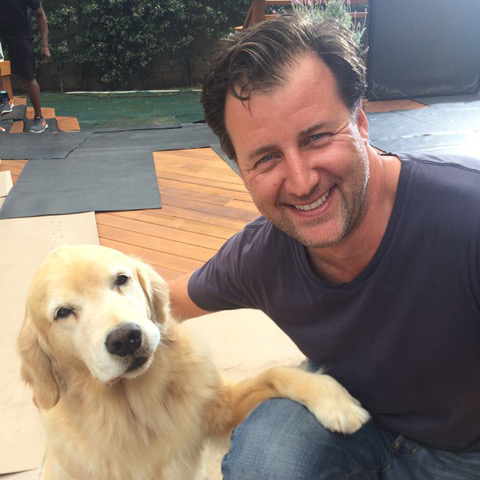
Rudy Van Zyl
Rudy was born in South Africa and grew up in what is now known as Kwa-Zulu, Natal. While in South Africa, Rudy worked in the Kruger National Park as a Game Ranger but always wanted to be a filmmaker. He moved to New York City in 1995 and started working his way up the production ranks on commercials, music videos, and films. Rudy’s work brought him to Los Angeles in 1997 and he joined the Director’s Guild of America in 2003.
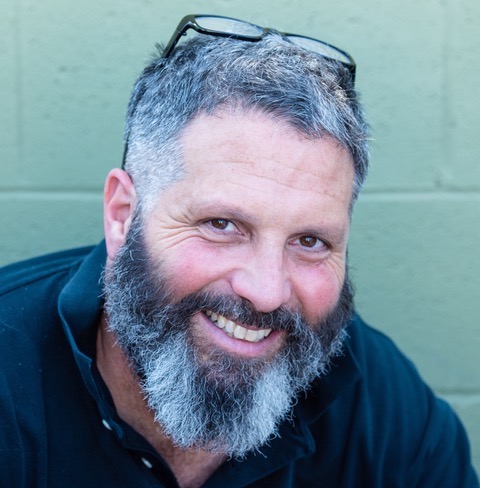
Billy Greenfield
Billy Greenfield has worked in film, television and commercial production for close to twenty-five years on more than fifty feature films and television shows as either an Assistant Director, Unit Production Manager, Line Producer or Associate Producer.
He has worked with Directors such as Walter Hill, George Clooney, Eric Stoltz, Nancy Hower, Stacy Title and Marshall Herskovitz, and Actors such as Robert Duvall, Ed Harris, Bryan Cranston, Vincent D’Onofrio, Will Ferrell, Seth Rogen, Sam Shephard, Selena Gomez, Megan Fox, Ashley Greene, John C. Reilley, Jason Bateman, Will Arnett and Danny Trejo, and on music videos with musical acts including Destiny’s Child and The Foo Fighters.
His most recent projects were as Production Manager on Dollface for ABC/Hulu, Get Shorty for MGM/Epix and Fatal Affair for Netflix, and as Line producer on the Epic Games Megagrant project Gods of Mars, which utilizes Epic’s Unreal Engine to combine traditional CGI, LED projection and practical miniatures to create photo-realistic visual effects in real time.
He grew up in St. Louis, Missouri and earned a Bachelor’s Degree in Journalism from the University of Missouri-Columbia. He attended Graduate Film School at San Francisco State University and the Graduate Video Program at Webster University in St. Louis, Missouri.
He is an active member of the Director’s Guild of America and serves on the DGA’s Visual Effects and New Technology Committee.
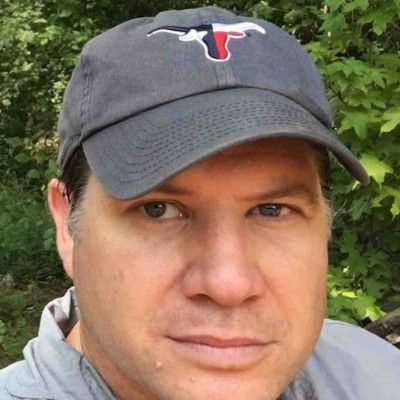
Tony Kountz
I am from La Porte, TX, a small industrial port town near Houston. I graduated from the University of Texas at Austin in 1993 with a BA in English. I went to college to pursue a chemical engineering degree but ended up just trying to graduate with the quickest degree I could get.
During this time I discovered the Radio, Television, and Film department at UT. TV news interested me but I didn’t want to spend the time in college to get an RTF degree since I had already been in school for three years. However, I did find an internship at a local TV station. Part of that job was to help shoot local commercials. This experience put me on the path to becoming an Assistant Director.
I started taking local jobs in Austin, TX that put me on TV and film sets. I did any and every job I could get to learn more about the business in which I was interested. Eventually, I was hired as a Set Production Assistant on a movie called Bottle Rocket. That led to meeting some great mentors who encouraged me to move to Los Angeles.
Once in LA, my mentors helped get me on more sets as a PA and finally as a 2nd AD. I was able to quickly move up to a 1st AD on low budget shows.
I joined the Directors Guild of America in 1999 and have worked on many films and TV programs since then. I am currently the 1st AD on Stargirl, which airs on the CW. Recently, I was the 1st AD on MacGyver, and The Originals.
References
- 1ZipRecruiter. "First Assistant Director Salary". ZipRecruiter. published: 30 September 2022. retrieved on: 30 September 2022
